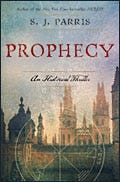Renaissance scholar Giordano Bruno, the sleuth in Prophecy, is still spying for Queen Elizabeth's adviser Francis Walsingham in the fall of 1583, six months after the grisly murders in Heresy. Europe is abuzz with dread and excitement over the impending astrological conjunction of Jupiter and Saturn.
Indebted to France because its Catholic king sheltered him after he fled his native Italy, Bruno lives in Protestant London now. As a trusted guest of the French ambassador, he regularly sits in on top-secret meetings of a cabal plotting to free Mary Queen of Scots and set her on the English throne. The conspirators include Scots, the thuggish Spanish ambassador, disaffected English Catholics, and France's influential de Guise family. The goal is to restore Catholicism to England, but the conspirators' motivations are more political and personal than pious. The French ambassador's fiendishly seductive wife is an eager co-conspirator.
Bruno's personal agenda is still to find the lost fifteenth book of Hermes Trismegistus. Its contents are so inflammatory that the distinguished translator of the other volumes refused to translate this one, "believed to set forth the mystery of man's divinity" and "the secret of becoming equal to God." In his search, Bruno has made friends with someone dangerous to know: the queen's astrologer John Dee, whose attempts to conjure spirits could draw heresy accusations from Protestants and Catholics both.
The characters in Prophecy are richly drawn, especially the intelligent, politically moderate French ambassador whose kindness to Bruno, a spy in his house, pains Bruno's conscience. Woven into the vividly authentic historical setting is a flamboyant fictional murder mystery. Someone has killed one of Queen Elizabeth's maids of honor and carved an astrological symbol into her body. Who? Is it a practice run for an assassination attempt on the queen? Can Bruno survive his efforts to find answers? (2011; 375 pages)




